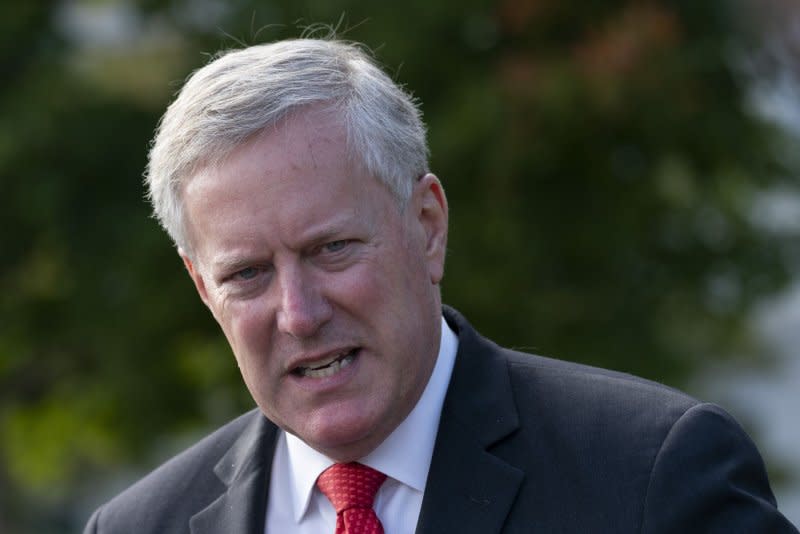Mark Meadows in Georgia court: Time with Donald Trump was 'challenging'

- Oops!Something went wrong.Please try again later.
- Oops!Something went wrong.Please try again later.
- Oops!Something went wrong.Please try again later.
Aug. 28 (UPI) -- Former White House chief of staff Mark Meadows said in an Atlanta courtroom Monday that his time serving under former President Donald Trump was "challenging."
At the hearing on Meadows' request to move his trial to federal court, he testified he was involved with most of Trump's meetings -- sometimes as an instrumental participant, sometimes as an observer.
Meadows' hearing ended early Monday evening without a ruling from U.S. District Judge Steve C. Jones.
Meadows, who was on the stand for more than three hours, described his tenure in the White House as "challenging times, bluntly."
A prosecutor from Fulton County, Ga., District Attorney Fani Willis' office questioned Meadows, who surrendered in Atlanta last week after another judge rejected his request to block his arrest if he failed to turn himself in.

The hearing before Jones was one of several that Meadows faces as defense attorneys argue for his immunity in the case, claiming he was a federal official acting on direct orders from Trump when he allegedly aided a conspiracy to overturn the 2020 election results in Georgia.
Meadows argues that because his role included working closely with state officials, his case should be tried in federal court. He also said arranging a call between Trump and Georgia Secretary of State Brad Raffensperger and observing a ballot audit in Cobb County fell in line with his duties as chief of staff.
Raffensperger took the stand after Meadows, telling the court that he believed the call to be a campaign call as members of the White House and Justice Department were not involved. He added that he and his wife were threatened on numerous occasions because of allegations of election fraud.
Meadows also detailed phone calls he had with Secretary of State Mike Pompeo and Joint Chiefs of Staff Gen. Mark Milley in the days following the Jan. 6, 2021, attack on the U.S. Capitol. During those calls, the three discussed foreign adversaries' perceptions that the United States is "weak" in light of the attack.
He did not deliver definitive responses to all of the questions from the prosecution. Notably Meadows did not say whether or not he believes Trump won the 2020 election when asked by the prosecution.
"He believed he won," he said. "I believed there were additional things that needed to be investigated."
The prosecution pressed him to explain why Trump's former attorneys Rudy Giuliani and Jenna Ellis were on the call with Raffensperger, considering they were not federal employees. Meadows also said he could not recall the efforts he made to set up the phone call.
A total of 19 defendants, including Trump, are charged under Georgia's Racketeer Influenced and Corrupt Organizations law, and many of the accused face multiple counts, including conspiracy to defraud the state, forgery, criminal attempt to file false documents, false statements and writings and conspiracy to commit election fraud.
Ahead of Monday's hearing, prosecutors subpoenaed four witnesses -- including a former chief investigator for the Georgia secretary of state's office and two attorneys connected to Trump -- who may testify in what could be the curtain-raiser to a potential trial and provide deeper insight into Meadows' actions following the 2020 election.
Meadows is charged with soliciting an official to violate their oath of office because of his presence on the infamous "find" votes call between Trump and Raffensperger.
Meadows is also accused of violating the federal Hatch Act, which prohibits officials from using their government status to influence an election.
His attorneys have indicated they will file a motion asking the judge to dismiss the charges if they win on the motion filed Tuesday to move his case from Fulton County Superior Court to the U.S. District Court for the Northern District of Georgia.
"Mr. Meadows has the right to remove this matter. The conduct giving rise to the charges in the indictment all occurred during his tenure and as part of his service as chief of staff," his filing reads.
In court papers filed last week, prosecutors argued Meadows was not performing his White House duties at the time but working for Trump's political campaign, which fell "outside the lawful scope of his authority as chief of staff."
For the motion to be granted, the judge will have to agree that Meadows was acting in his official capacity when he allegedly participated in Trump's attempts to overturn the 2020 presidential election.
Either ruling in the case holds broad implications in separate pretrial hearings for the other accused, as at least four more co-defendants were seeking federal intervention.
They include former Justice Department official Jeffrey Clark; former Georgia Republican Party Chairman David Shafer; Georgia state Sen. Shawn Still, who served as a fake elector, along with Cathy Latham, former chairwoman of the Republican Party in Coffee County, Ga. She faces a dozen charges related to her role in the alleged scheme.
Legal experts said Meadows and the others stood to gain leniency and a more favorable jury if their cases went to trial at the federal level.
The wide-ranging indictment comes more than two years after a violent mob stormed Congress to disrupt certification of Joe Biden's election win and keep Trump in office after he lost the vote but falsely claimed the process was rigged.
Meanwhile, a judge in Washington on Monday set a March 4 trial date for Trump on the federal case charging him with election interference.

